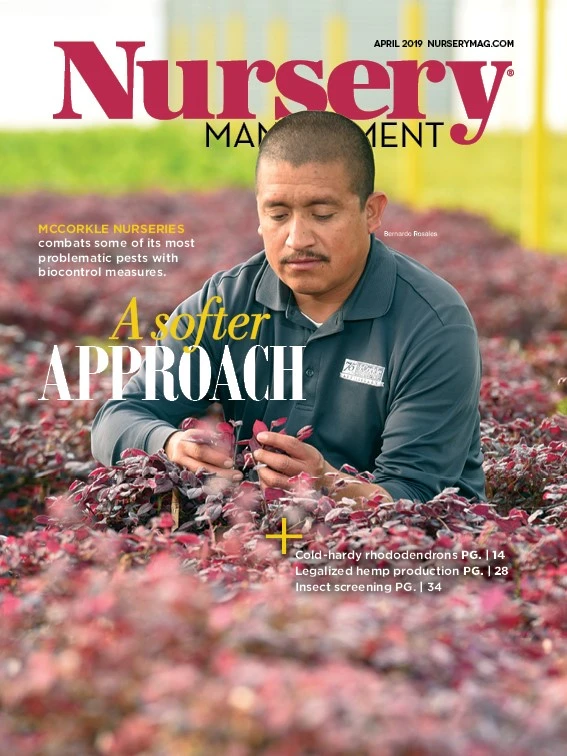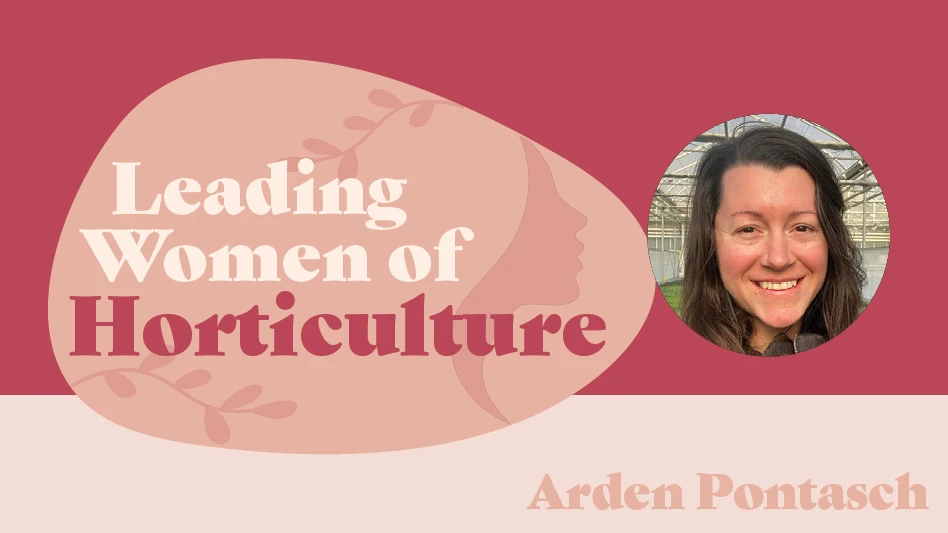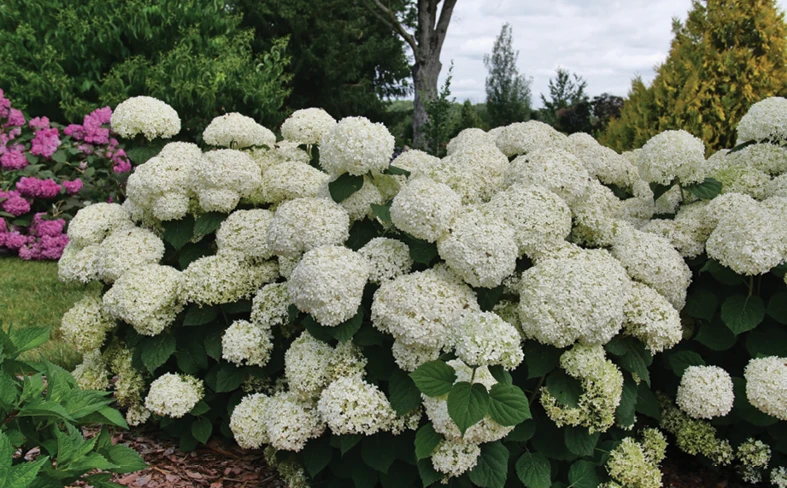

to scout, treat and make observations about treatments.
The plant health team at McCorkle Nurseries was faced with a predicament when certain pest-control regulations were being considered by policymakers and when it looked as if some pesticides may be removed from the market. And in 2015, some of McCorkle’s customers requested plants that had not been treated with neonicotinoids. It was clear that the nursery needed some new strategies. The McCorkle team acted swiftly and stepped out of its pest-control comfort zone.
In 2015, the nursery introduced predatory wasps for aphid control and predatory mites for spider mite pressures into its integrated pest management program.
Bernardo Rosales, McCorkle’s plant health manager, took the lead and learned all he could about biocontrol to better understand this pest-control tool.
He started small. Rosales trialed small blocks of crops – some with only 300 plants – and discontinued general pesticide use on the trial areas.
After some trial and error, a lot of conversation with biocontrol company technical reps, and biocontrol training through Michigan State University, the nursery now treats 10 acres of greenhouses with Aphidius colemani, predatory wasps for aphids, which tend to infest the loropetalum crop each spring.
A. colemani are shipped in vials and released in enclosed greenhouses from early January through mid-May. The 200-by-600-foot gutter-connected ranges are filled pot-tight, which helps the wasps in their work.
The nursery wants early control, and since its greenhouses don’t get too cold, the crew is able to start biocontrol releases in mid-January. Once the greenhouse sides are opened, which is typically done in May, other pests start coming in from the field. These new invaders include leaf-feeding beetles, which the predatory wasps do not control.

The nursery also adopted a banker plant system to rear bird cherry oat aphids, which act as a meal for the A. colemani to help sustain them. The bird cherry oat aphid spends its lifecycle on barley and oat plants, which are placed throughout the greenhouse. McCorkle purchased a banker plant system at first, then began growing its own barley and oat crops so the bird cherry oat aphid will spread to them.
McCorkle receives about 7,500 wasps per shipment. Rosales says to inspect shipments as soon as possible to look for mortality. Shipments, which arrive cold, have a “best by” date. Remove them from the boxes and let the wasps come to room temperature.
The nursery also uses predatory mites for spider mite control in about 8,000 square feet of propagation quonsets, a task that Rosales and his team are still perfecting. A key to predatory mites is temperature, he says. The temperature requirement depends on the species of the mite. Some are active while it’s hot; others are active when it’s cooler. The temperature in those propagation houses fluctuates quite a bit and there is no supplemental ventilation.
The nursery learned that if there is a lot of space between plants, it’s tough to get good coverage with the predatory mites.
McCorkle uses beneficial nematodes on azalea primarily to combat the strawberry rootworm, but they also work on thrips.
There was quite a learning curve associated with the nematodes. It’s not as straightforward as putting them in a sprayer and drenching them into the crop. After experimenting with several methods, as well as receiving feedback from suppliers, Rosales and his crew learned not to apply them in the middle of the day, but instead to apply late in the evening when it’s overcast. They also discovered that it’s important to remove the filter from the sprayer, not to use a centrifugal pump and the proper PSI for application.
“We had some ups and downs, but we had experts helping us,” he says.
Some of these requirements for beneficial nematode application make it a little tough to adopt on a larger scale.

The nursery went into the entire biocontrol program “knowing we don’t know everything,” says Brian Jernigan, production manager. “We’re still learning, and when you start something like this, failures aren’t really failures because you learn from them.”
The first year the wasps were released, Rosales and Jernigan noticed how many lady beetles appeared in the greenhouses. Rosales and his team now look at pest control differently.
Rosales was instrumental in helping his crew understand, accept and embrace the new program.
“Biocontrol just makes more sense and there are so many benefits to it,” Rosales says.
The entire plant health team attends classes and supports one another in the process.
“They see the advantage of not having to spray an entire greenhouse. They know they’re working in a safe environment where they don’t need respirators and there are no REIs,” Jernigan says. “This type of program is something you can be proud of.”
McCorkle’s current biocontrol program doesn’t work on every pest, such as the red-headed flea beetle. But that pest doesn’t appear until later in the season (around summer), so the plant health team can plan around it. However, the nursery and JC Chong from Clemson University is trialing beneficial nematodes for flea beetle control.
There’s a lot to learn regarding biocontrol programs, which can be frustrating, but it’s worth it, says both Rosales and Jernigan.
Jernigan says at this stage, it’s difficult to compare the costs of a biocontrol program to a traditional program.
“There’s more to it than a straight comparison of dollars and cents,” he says. “You have to look at what effect pest control methods have on your entire operation, look at where the industry is going in the future, market demands and changes in registration. But once we get completely established and have the program to the point of where we can fully utilize it, then we can look closely at those costs.”
As the nursery gets more comfortable with different pest groups and learns more strategies, it will expand the biocontrol program.
For more: www.mccorklenurseries.com
Get curated news on YOUR industry.
Enter your email to receive our newsletters.
Explore the April 2019 Issue
Check out more from this issue and find your next story to read.





